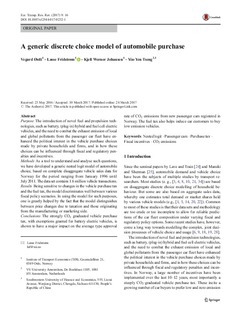A generic discrete choice model of automobile purchase
Journal article, Peer reviewed
Published version
Permanent lenke
http://hdl.handle.net/11250/2603518Utgivelsesdato
2017-03-24Metadata
Vis full innførselSamlinger
Sammendrag
Purpose The introduction of novel fuel and propulsion technologies, such as battery, (plug-in) hybrid and fuel cell electric vehicles, and the need to combat the exhaust emission of local and global pollutants from the passenger car fleet have enhanced the political interest in the vehicle purchase choices made by private households and firms, and in how these choices can be influenced through fiscal and regulatory penalties and incentives. Methods As a tool to understand and analyse such questions, we have developed a generic nested logit model of automobile choice, based on complete disaggregate vehicle sales data for Norway for the period ranging from January 1996 until July 2011. The data set contains 1.6 million vehicle transactions. Results Being sensitive to changes in the vehicle purchase tax and the fuel tax, the model discriminates well between various fiscal policy scenarios. In using the model for such purposes, one is greatly helped by the fact that the model distinguishes between price changes due to taxation and those originating from the manufacturing or marketing side. Conclusions The strongly CO2 graduated vehicle purchase tax, with exemptions granted for battery electric vehicles, is shown to have a major impact on the average type approval rate of CO2 emissions from new passenger cars registered in Norway. The fuel tax also helps induce car customers to buy low emission vehicles.

